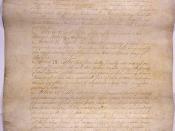The Articles of Confederation, drafted in 1776, during the 2nd Continental Congress, was ratified on March 1, 1781. They remained the unifying document of the states until June 21, 1788. The product of some of the greatest minds to ever exist, The Articles did have some positive effects on society. They successfully put an end to the Revolutionary War, negotiated a favorable end to the war in the Treaty of Paris, and created a model for the admission of new territories courtesy of the Northwest Ordinance. Nonetheless, they were far too weak to give the newborn nation the necessary foundation it needed.
As the first written constitution of the United States, the Articles of Confederation created a unicameral legislature where each state was represented equally. Congress had jurisdiction over foreign relations with the authority to form alliances and make treaties, declare war, sustain an army and navy, coin money, establish a postal service, create admiralty courts, and settle disputes between states.
During the ratification process Maryland had raised the issue of western lands that other larger states possessed. In one of its most successful elements The Articles allowed expansion and created an admission process for new states. Another successful point was in the allocation of equal votes in Congress for each state and the decree that most decisions be decided by majority vote.
Under the Articles of Confederation Congress had no power to tax the states, instead it depended on donations by the states. However, the states desired moderate autonomy and therefore, were repulsed by the idea of federal taxation. Deficient in adequate funding, inflation soon overwhelmed the nation, devaluing currency by 98 percent. Another obstacle in effective governing was Congress' lack of power in enforcing its laws, instead depending on voluntary compliance by the states. In addition,


